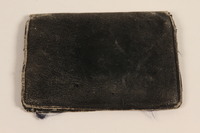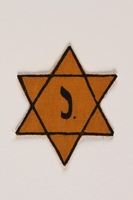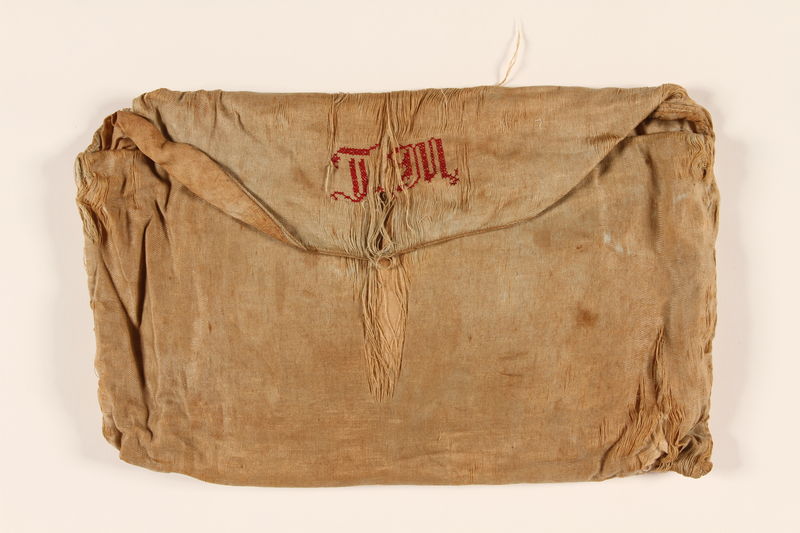Overview
- Brief Narrative
- Monogrammed cloth clutch used by Lea Abramowicz and her husband Mendel while the couple lived in hiding in German occupied Belgium from September 1942 to September 1944. The couple used the purse to store photographs and correspondence. It might originally have been Lea's mother's, Tauba Mescherowsky. Lea and Mendel were living in Brussels when Germany invaded on May 10, 1940. After the Germans began large scale deportations of Jews in September 1942, they went into hiding under the false surname Abeloos. One month later, Lea had a son, Georges, who was hidden separately. Lea and Mendel stayed in their apartment for a year and a half, then moved to the outskirts of Brussels, assisted by Oskar and Nana Ruyts. Lea eventually had to take Georges into hiding with them because he was teething and cried at night and those hiding him feared discovery. They had to move to two more times as the crying made neighbors suspicious. Lea, Mendel, and Georges were liberated by American forces on September 3, 1944.
- Date
-
use:
1942-1944
- Geography
-
use:
Brussels (Belgium)
- Credit Line
- United States Holocaust Memorial Museum Collection, Gift of Myriam Abramowicz
- Markings
- front, center of flap, cross stitched, red thread : T(?) M [possibly for Tauba Mescherowsky]
- Contributor
-
Subject:
Lea Abramowicz
- Biography
-
Lea Mescherowsky was born on March 1, 1906, in Aleksandriia, Russia (now Oleksandriia, Ukraine), to a Jewish couple, Hersh Tzvi (Gregor) and Tauba (1885-1968) Mescherowsky. Lea had four siblings: Shura (1909-1997), Sasha Alexander, Bernard (1914-1985), and Arnold. Lea’s father Gregor designed agricultural equipment and had a business in Odessa. In 1917, the Russian Revolution began. In 1921, Lea and her family illegally fled because of the pogroms. They went to Zoppot, Germany (Sopot, Poland), then to Danzig (Gdansk, Poland). There was a large community of Jewish Russian refugees in Danzig. The family was able to have a normal life and attend synagogue.
In January 1933, Hitler came to power in Germany. Gdansk was formerly part of Prussia and still very influenced by German politics and culture. Antisemitism increased and life became difficult for the Mescherowsky family. Lea experienced bad treatement for being Jewish. In 1934, Lea left Danzig and lived briefly in Berlin, where she worked in a bank. She then moved to Brussels, Belgium. In 1935, Lea’s father Gregor died of a heart attack. Lea’s sister Shura came to live with her in Brussels. In 1936, Lea’s mother, Tauba, and brother, Bernard, also moved to Brussels. Lea’s brother Sasha and his wife emigrated to Palestine. In 1936, Lea met Mendel Abramowicz, who was born on March 3, 1903, in Łódź, Poland. He had three siblings: Lena, Golda, and Henri. Mendel had immigrated to Palestine in the 1920’s, but returned after a short time. He then moved to Belgium and trained as a cantor, but worked in the diamond and fur trade. His family owned a kosher restaurant in Ostend. Lea and Mendel married in 1937. That same year, Lea’s brother Arnold died in an accident. In 1938, Lea and Mendel had a daughter, Jenny Ita, who died of pneumonia when she was six weeks old. After Germany invaded Poland in September 1939, Tauba, Shura, and Bernard went to France.
On May 10, 1940, Germany invaded Belgium. In May 1942, it was decreed that Jews had to wear Star of David badges. In September 1942, the Germans began rounding up Jews for deportation, so Lea and Mendel went into hiding. On October 7, Lea had a son, Georges. The doctor who delivered Georges was a resistance member and contacted the Association des Juifs en Belgique (Association of Jews in Belgium). They found a hiding place for Georges in a hospital, the Clinique Edith Cavell. The AJB later found another place for Georges about ten miles outside of Brussels. Lea could visit him occasionally, but there was a risk that she would be caught and arrested. Mendel could not come because he looked Jewish and was afraid he would be arrested. The AJB did not usually encourage Jews to go into hiding, but Mendel’s brother-in-law Joseph (Oskar) Orbach, Golda’s husband, worked for the AJB and the Comite Defense des Juifs (Defense Committee of Jews) and helped many Jewish children. Lea and Mendel used the false last name Abeloos and stayed in their own apartment. At one point, Lea returned to their apartment to find that while she and Mendel were out, it had been searched and sealed by the Gestapo. They had been targeted by a notorious Jewish informer, Jacques. After a year and a half, the couple moved to a hiding place on the outskirts of Brussels. They were assisted by Mendel’s non-Jewish friend from before the war, Oskar Ruyts. Oskar and his wife Nana were a wealthy couple who owned a dry goods store. They hid 22 Jews in their store. Oskar found a hiding place for Lea and Mendel and also hid their photographs and personal papers. Mendel earned money by trading in the black market and exchanging currency. He was arrested a few times for curfew violations but escaped. Lea went to visit Georges and was told that she needed to take him with her because he was developing a health issue. Lea sometimes kept Georges with her and Mendel, but the infant, now 15 months old, was teething and cried at night, causing the neighbors to be suspicious. Oskar Ruyts found them two additional hiding places when they had to move because of the noise. On September 3, 1944, the area was liberated by American forces. The war ended when Germany surrendered on May 7, 1945.
Lea and Mendel learned that Lea’s mother Tauba, sister Shura, and brother Bernard had survived in France. When they had arrived in France in 1939, they were held in an internment camp in Lunel, where Shura met Lorenzo Teixidor (1911-1977). In 1941, Tauba, Bernard, Shura, and Lorenzo left the camp with documents from the underground. Shura and Lorenzo married and had two daughters. Mendel’s brother Henri was murdered in Auschwitz and his sister Lena and her children also perished. In June 1946, Lea and Mendel had a daughter, Myriam. In 1948, Mendel had a heart attack. On October 27, 1955, Mendel left on the SS Queen Mary, arriving in New York on November 1. On November 25, Lea and the children sailed on the SS Queen Mary, arriving in New York on November 30. The family settled in New York. Georges Americanized his name to George. Mendel, age 60, died on February 17, 1964, in New York. Lea’s mother Tauba died in 1968 in France. Lea’s sister Shura, age 88, died on December 17, 1997, in France. Lea, age 91, died on February 13, 1998, in New York.
Physical Details
- Classification
-
Dress Accessories
- Category
-
Carried dress accessories
- Object Type
-
Handbags (lcsh)
- Physical Description
- Extremely worn, stained, frayed, rectangular, lightweight offwhite cloth purse with a rounded front flap. There is a large hole at the bottom of the flap, probably a buttonhole that has torn, and a circular iridescent white plastic button on the bag. The interior is lined with stained offwhite cloth. Two initials are cross stitched in red thread on the flap.
- Dimensions
- overall: Height: 8.000 inches (20.32 cm) | Width: 12.625 inches (32.068 cm)
- Materials
- overall : cloth, thread, plastic
Rights & Restrictions
- Conditions on Access
- No restrictions on access
- Conditions on Use
- No restrictions on use
Keywords & Subjects
- Topical Term
- Hidden children (Holocaust)--Belgium--Biography. Holocaust, Jewish (1939-1945)--Belgium--Brussels--Personal narratives. Jewish children in the Holocaust--Belgium--Brussels--Biography. Jewish refugees--Belgium--Biography. Jews--Rescue--Belgium--Brussels--Biography. World War, 1939-1945--Underground movements--Belgium--Personal narratives, Jewish.
- Geographic Name
- Belgium--History--German occupation, 1940-1945--Biography.
Administrative Notes
- Legal Status
- Permanent Collection
- Provenance
- The purse was donated to the United States Holocaust Memorial Museum in 2003 by Myriam Abramowicz, the daughter of Lea Abramowicz.
- Funding Note
- The cataloging of this artifact has been supported by a grant from the Conference on Jewish Material Claims Against Germany.
- Record last modified:
- 2022-07-28 18:29:52
- This page:
- https://collections.ushmm.org/search/catalog/irn522859
Download & Licensing
In-Person Research
- By Appointment
- Request 21 Days in Advance of Visit
- Plan a Research Visit
- Request to See This Object
Contact Us
Also in Lea Abramowicz family collection
The collection consists of a purse, Star of David badge, wallet, documents, and photographs relating to the experiences of Lea Abramowicz and her family before the Holocaust in Russia, Danzig, and Palestine, during the Holocaust when they lived in hiding in Belgium, and after the Holocaust in Belgium and the United States.
Date: 1906-1961

Black leather bi-fold wallet used by a Jewish family in hiding
Object
Black leather wallet used by Lea Abramowicz and her husband Mendel while the couple lived in hiding in German occupied Belgium from September 1942 to September 1944. Lea and Mendel were living in Brussels when Germany invaded on May 10, 1940. After the Germans began large scale deportations of Jews in September 1942, they went into hiding under the false surname Abeloos. One month later, Lea had a son, Georges, who was hidden separately. Lea and Mendel stayed in their apartment for a year and a half, then moved to the outskirts of Brussels, assisted by Oskar and Nana Ruyts. Lea eventually had to take Georges into hiding with them because he was teething and cried at night and those hiding him feared discovery. They had to move two more times as the crying made neighbors suspicious. Lea, Mendel, and Georges were liberated by American forces on September 3, 1944.

Star of David badge with letter J owned by Jewish Belgian couple
Object
Star of David badge worn by Lea or Mendel Abramowicz in Brussels, Belgium, until the couple went into hiding in September 1942. On May 27, 1942, the German authorities decreed that all Belgian Jews had to wear a Star of David badge to identify them as Jews. Belgium was invaded by Nazi Germany on May 10, 1940. After the Germans began large scale deportations of Jews in September 1942, the couple went into hiding under the false surname Abeloos. One month later, Lea had a son, Georges, who was hidden separately. Lea and Mendel stayed in their apartment for a year and a half, then moved to the outskirts of Brussels, assisted by Oskar and Nana Ruyts. Lea eventually had to take Georges into hiding with them because he was teething and cried at night and those hiding him feared discovery. They had to move two more times as the crying made neighbors suspicious. Lea, Mendel, and Georges were liberated by American forces on September 3, 1944.
Abramowicz family papers
Document
Consists of photographs and documents regarding the Holocaust experiences of the Abramowicz family. The manuscript collection includes numerous family photographs (approx 100), documents showing pre-war life, post-war correspondence and identity documents while they were in hiding in Belgium.




